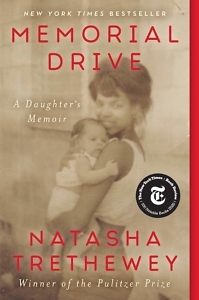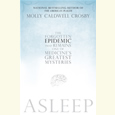Saving What Remains
Poet Natasha Trethewey’s memoir revisits her Mississippi childhood and her mother’s violent death
Every photograph says “remember.” It’s no surprise then that poet Natasha Trethewey enters into the prologue of Memorial Drive, a memoir about her mother Gwendolyn Ann Turnbough, by looking at the last image of Gwendolyn, taken a few months before her murder. Her black dress blends in with the backdrop, and Trethewey says her mother appears to emerge “from it as from the depths of memory.” In this same way, Trethewey delves into memory like never before in this book and allows us to witness her resurfacing.

This may seem no big deal to lovers of Trethewey’s work. The former U.S. Poet Laureate is a poet of memory, after all, often spelunking through family photographs to find meaning and evoking dreams to concoct the perfect alchemy of metaphor. She details freckles on skin. We get the scent of moss floating through the streets on a visit to New Orleans. Her career addresses the collective memory and mythmaking of the South, and she weaves this long memorialized regional pain seamlessly into her personal history. She even notes that the street where her mother was murdered in Georgia, by her second husband, runs into the Confederate memorial Stone Mountain. It’s called Memorial Drive.
Poetry fans will notice many of their Trethewey favorites unfold on these prose pages about her earliest days as a “child of miscegenation” — growing up with her Black mother and white father in Gulfport, Mississippi, before their divorce. Her poems become almost like delightful Easter eggs in the first part of the book. We get the birthmark story of her poem “My Mother Dreams Another Country.” She lets us in on a secret about her poem “Incident,” in which the Klan burns a cross in her driveway during her infant memory. It’s a treat to see how many poems you can remember, but a knowledge of Trethewey’s oeuvre isn’t necessary to enjoy her account of a wonder-filled, albeit imperfect, childhood with her family in Mississippi: “Those afternoons passed deliciously slow; at teatime she’d serve iced tea with butter sandwiches — the brown edges cut off and soaked in milk laced with sugar. All the days sweet like that.”
And yet, less than 10 pages into Memorial Drive, Trethewey tells us her relationship with memory is fraught. She has, she says, cultivated a “mute avoidance of my past, silence and willed amnesia buried deep in me like a root.” I’m tempted to debate her self-perception. No reader would dare call Trethewey mute. Nor silent. Nor unwilling to recall.
But then we get to Atlanta.
We reach Atlanta in a chapter titled “Terminus” (recalling the city’s original name), and it represents a catastrophic end: “I chose to mark the calendar year just after my mother and I left Mississippi, then, as ending, and the moment of loss — her death — as beginning.”
 She begins forgetting on the tumultuous trip from Gulfport. Her mother recalls it as a good trip, but Trethewey questions her elementary-aged memories: “Instead, I am haunted by a memory of smoke billowing from the hood of the car toward the skyline. I know this happened, but when? Perhaps the trauma of those years has made me collapse time and conflate the events … .”
She begins forgetting on the tumultuous trip from Gulfport. Her mother recalls it as a good trip, but Trethewey questions her elementary-aged memories: “Instead, I am haunted by a memory of smoke billowing from the hood of the car toward the skyline. I know this happened, but when? Perhaps the trauma of those years has made me collapse time and conflate the events … .”
This foreboding moment sets the stage for Atlanta. There, her mother marries “Big Joe,” and we enter into Trethewey’s terrifying reality of domestic abuse, so painful in one chapter she only accesses it in second-person storytelling:
At home you catch your mother alone, sitting on the bed, her left temple dark and swollen. Standing in front of her, eye level, you shift your weight from one leg to the other, your head down. ‘Mommy,’ you say quietly, so as not to be overheard.
Memorial Drive gives us a tender entry into the process of saving what remains. Tender in the way a wound feels raw and untouchable, but Trethewey lets us touch it with her. Tender in the way a potter holds wet clay in her hands to build a vase, knowing how fragile the clay has to get before it can hold something beautiful. Trethewey gets fragile. And she doesn’t simply build a vase to place daffodils on her mother’s grave; she builds a monument. We will never touch the physical body of her mother, but Trethewey gives us her stone feet, stuck too long in a violent marriage. We don’t get her breath, but we gasp and exhale with her in the letters, postcards, telephone transcripts, and notes from her yellow legal pad. Behind the stone breasts Trethewey erects for her, we feel a thrumming heart through her daughter’s willingness to un-forget.
Natasha means “resurrection” in Greek. A believer in the significance of numbers, Trethewey says she started resurrecting memories 33 years after her mother’s death, significant to her because Jesus died at 33. She crafts a memoir that will never resurrect her mother, but perhaps resurrects a poet within herself whom we have yet to know. I expect whatever else she gifts us with in the future might be even more sacred, more holy and, somehow, more true.
[This article originally appeared on August 4, 2020.]

Ciona Rouse is the author of the chapbook Vantablack (Third Man Books, 2017). Her poetry has appeared in Oxford American, NPR Music, The Account, Talking River, Gabby Journal, and other publications. She is poetry editor of Wordpeace. Along with poet Kendra DeColo, Rouse hosts the literary podcast Re\VERB.


